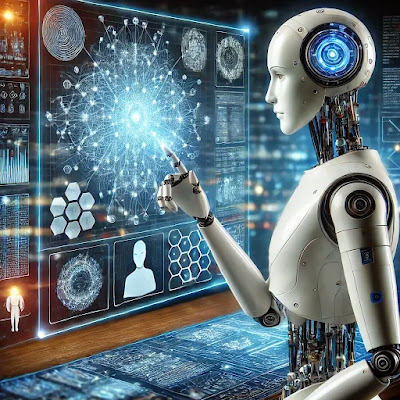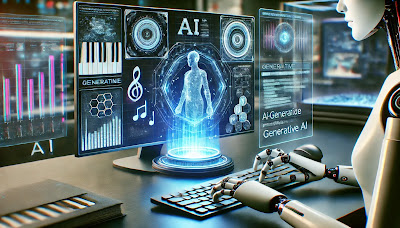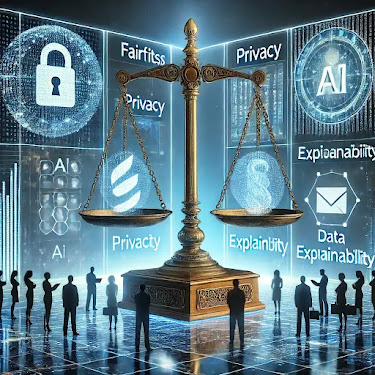The Future of Artificial Intelligence (AI)
What is AI?
Artificial Intelligence (AI) is the simulation of human intelligence in machines, enabling them to perform tasks that typically require human cognition. These tasks include learning, reasoning, problem-solving, perception, and language understanding. AI systems are designed to analyze data, recognize patterns, and make decisions with minimal human intervention.
Advancements in Generative AI
Generative AI has made remarkable progress in recent years, transforming various industries through its ability to create text, images, audio, and even videos. With the rise of models like OpenAI’s GPT-4, Google’s Gemini, and Meta’s Llama, AI-generated content is becoming more realistic and sophisticated.
One of the biggest breakthroughs is in natural language processing (NLP). AI-powered chatbots and virtual assistants can now generate human-like responses, assist in content creation, and even write code. Businesses are using generative AI to automate customer service, create marketing content, and enhance productivity.
In the creative field, AI-generated art and music have gained widespread popularity. Tools like MidJourney and DALL·E allow users to create stunning images from simple text prompts, while AI music generators compose original songs. These advancements are blurring the lines between human and machine creativity.
Generative AI is also revolutionizing video production. AI models can now generate lifelike animations, deepfake technology is improving, and AI-driven video editing tools are streamlining content creation. This has major implications for entertainment, advertising, and even education.
However, with these advancements come challenges. Ethical concerns about deepfakes, misinformation, and AI-generated plagiarism are growing. Companies are now focusing on improving AI transparency and implementing safeguards to ensure responsible AI use.
Looking ahead, generative AI is expected to become even more powerful, with better contextual understanding, improved personalization, and enhanced multimodal capabilities that seamlessly combine text, images, and audio. As AI continues to evolve, it will play an even greater role in shaping the future of content creation and automation.
AI and Automation in the Workplace
Artificial Intelligence (AI) and automation are revolutionizing workplaces across industries, enhancing efficiency, productivity, and decision-making. AI-powered systems are now handling repetitive tasks, allowing employees to focus on more strategic and creative work.
One of the biggest impacts of AI in the workplace is process automation. Robotic Process Automation (RPA) is being used in industries like finance, healthcare, and manufacturing to perform routine tasks such as data entry, invoice processing, and customer support. AI-driven chatbots and virtual assistants are improving customer service by handling inquiries, resolving complaints, and providing real-time assistance.
AI is also transforming decision-making. Advanced analytics and machine learning algorithms help businesses predict market trends, optimize supply chains, and personalize customer experiences. For example, AI-powered recommendation engines in e-commerce platforms suggest products based on user behavior, increasing sales and engagement.
In human resources, AI is streamlining recruitment by scanning resumes, identifying top candidates, and even conducting initial interviews using natural language processing (NLP). AI is also being used for employee engagement, performance tracking, and training, ensuring a more efficient workforce.
While AI and automation bring many benefits, they also pose challenges. Job displacement is a major concern, as automation replaces certain roles. However, new opportunities are emerging in AI development, maintenance, and oversight. Businesses must focus on upskilling employees to work alongside AI rather than be replaced by it.
Looking ahead, AI will continue to reshape workplaces with smart automation, predictive analytics, and enhanced collaboration tools. Organizations that embrace AI-driven solutions will gain a competitive edge, making workplaces more efficient, innovative, and adaptable to future challenges.
Ethical Challenges and AI Governance
As artificial intelligence (AI) becomes more powerful and widespread, ethical concerns and the need for strong governance are more pressing than ever. While AI offers numerous benefits, it also raises serious issues related to bias, privacy, accountability, and transparency.
One of the biggest ethical challenges is bias in AI algorithms. Since AI models learn from historical data, they can inherit and amplify biases present in that data. This has led to discriminatory outcomes in areas like hiring, law enforcement, and lending. Ensuring fairness in AI decision-making requires diverse datasets, unbiased training methods, and continuous monitoring.
Privacy and data security are also major concerns. AI systems collect and analyze vast amounts of personal data, often raising questions about user consent and data protection. Companies and governments must implement strict policies to prevent misuse of sensitive information and ensure compliance with data protection laws like GDPR.
Another challenge is accountability and transparency. Many AI models operate as "black boxes," making decisions without clear explanations. This lack of transparency can make it difficult to understand and challenge AI-driven outcomes, especially in critical areas like healthcare and criminal justice. To address this, researchers are working on Explainable AI (XAI), which makes AI decision-making more understandable.
AI governance is crucial to establishing ethical guidelines and regulations. Governments, tech companies, and international organizations are developing frameworks to ensure AI is used responsibly. Efforts include AI ethics committees, legal regulations, and industry standards for safe and fair AI deployment.
As AI continues to evolve, responsible development and governance will be essential to ensure that technology benefits society while minimizing risks. Ethical AI must prioritize fairness, privacy, and accountability to create a future where AI serves humanity responsibly.
AI in Healthcare and Cybersecurity
Artificial Intelligence (AI) is transforming both healthcare and cybersecurity, enhancing efficiency, accuracy, and protection in these critical fields. While AI improves medical diagnostics, treatment planning, and patient care, it also strengthens cybersecurity by detecting and preventing threats in real time.
AI in Healthcare
AI has revolutionized healthcare by enabling faster, more accurate diagnoses and personalized treatment plans. Medical imaging AI, for example, can analyze X-rays, MRIs, and CT scans with high precision, assisting doctors in detecting diseases like cancer, pneumonia, and neurological disorders at an early stage. AI-powered diagnostic tools reduce human error and improve patient outcomes.
Another major breakthrough is AI-driven predictive analytics. Machine learning models can analyze vast amounts of patient data to identify patterns and predict potential health risks. This allows for early interventions, reducing hospital readmissions and improving disease management, particularly in chronic conditions like diabetes and heart disease.
AI-powered chatbots and virtual assistants are improving patient engagement by providing instant responses to medical inquiries, scheduling appointments, and offering mental health support. Additionally, AI-driven robots are being used in surgeries, enhancing precision and reducing recovery times.
However, AI in healthcare also raises concerns regarding data privacy and security. As AI systems rely on large datasets, ensuring compliance with regulations like HIPAA (Health Insurance Portability and Accountability Act) and GDPR (General Data Protection Regulation) is crucial to protect patient information.
AI in Cybersecurity
Cybersecurity threats are increasing, and AI plays a vital role in defending against cyberattacks. AI-powered threat detection systems continuously monitor network traffic, identifying suspicious patterns and anomalies in real-time. These systems can prevent attacks before they cause damage, making cybersecurity more proactive than reactive.
AI is particularly useful in detecting and mitigating phishing attacks. By analyzing email content, sender behavior, and historical attack patterns, AI can flag suspicious emails and prevent employees from falling victim to scams. Similarly, AI-powered authentication systems, such as facial recognition and biometric verification, enhance security and prevent unauthorized access.
Another crucial application is automated incident response. When a cyberattack occurs, AI-driven security platforms can isolate affected systems, block malicious traffic, and generate real-time reports for cybersecurity teams. This speeds up response times and reduces the impact of security breaches.
Despite its benefits, AI in cybersecurity also poses risks. Hackers are using AI to develop more sophisticated attacks, such as AI-generated deepfake scams and automated hacking tools. To counter this, cybersecurity experts must continuously upgrade AI models to stay ahead of evolving threats.
The Road to Artificial General Intelligence (AGI)
Artificial General Intelligence (AGI) refers to a future form of AI that can perform any intellectual task a human can. Unlike today’s AI, which is specialized for specific tasks (Narrow AI), AGI would have reasoning, learning, problem-solving, and decision-making abilities comparable to human intelligence. While AGI remains a theoretical concept, significant progress is being made toward its development.
Current AI vs. AGI
Today's AI systems, such as chatbots, image generators, and recommendation algorithms, excel at specific tasks but lack true understanding. They rely on vast amounts of data and pattern recognition rather than actual reasoning or consciousness. AGI, on the other hand, would be able to learn and apply knowledge across multiple domains without needing extensive retraining.
Challenges in Achieving AGI
The road to AGI is filled with technological and philosophical challenges:
- Understanding Human Intelligence – Despite advances in neuroscience and AI, scientists still don’t fully understand how human cognition works. Replicating it in machines remains a major hurdle.
- Learning and Adaptation – Unlike Narrow AI, AGI must generalize knowledge and adapt to new, unseen situations without large-scale data training.
- Computational Power – AGI would require immense processing power and memory to function efficiently, surpassing today’s hardware capabilities.
- Ethical and Safety Concerns – An uncontrolled AGI could pose risks, from job displacement to existential threats. Ensuring that AGI aligns with human values is a critical challenge.
Progress and Future Possibilities
Researchers are exploring neuromorphic computing, which mimics the human brain, and self-learning AI models that require minimal supervision. Deep learning advancements, reinforcement learning, and brain-computer interfaces are also paving the way for AGI.
While AGI is still decades away, many experts believe that gradual improvements in AI capabilities will eventually lead to its emergence. The journey to AGI is not just about technology but also about ensuring it is developed responsibly for the benefit of humanity.
Conclusion
AI is revolutionizing industries, from content creation and workplace automation to healthcare and cybersecurity. While advancements in generative AI and automation boost efficiency, ethical concerns and governance remain crucial. The pursuit of AGI continues, promising transformative potential. Responsible AI development is key to ensuring a balanced, fair, and innovative future.







.%20The%20image%20features%20a%20highly%20advanced%20humanoid%20AI%20with%20a%20.webp)

